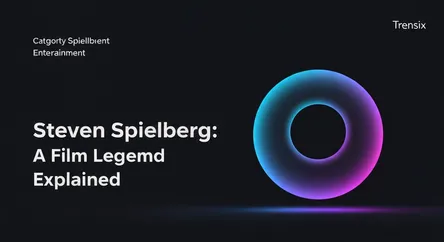Entertainment
Steven Spielberg: A Film Legend Explained

Discover Steven Spielberg, the iconic director behind classics like Jaws and E.T. Explore his lasting legacy and why his work continues to shape cinema.
What is it?
Steven Spielberg is a legendary American film director, producer, and screenwriter often regarded as one of the most influential filmmakers in history. He is a key figure in the New Hollywood era and is credited with pioneering the modern blockbuster. His filmography spans multiple genres and includes some of the highest-grossing films of all time, such as Jaws, E.T. the Extra-Terrestrial, Jurassic Park, and the Indiana Jones series. Beyond blockbusters, he has directed critically acclaimed dramas like Schindler's List and Saving Private Ryan, earning him multiple Academy Awards.
Why is it trending?
Spielberg's name consistently trends due to his ongoing projects and immense cultural footprint. Anniversaries of his classic films frequently spark online discussion and theatrical re-releases. His recent semi-autobiographical film, The Fabelmans, garnered significant awards season attention, bringing his personal story and filmmaking origins to a new audience. Furthermore, his production company, Amblin Entertainment, is always involved in new movies and television series, keeping his influence a constant in the entertainment news cycle. He remains a benchmark for cinematic storytelling and commercial success.
How does it affect people?
Steven Spielberg's work has a profound and lasting effect on global audiences. For generations, his films have defined the movie-going experience, creating shared cultural moments of awe, terror, and wonder. Movies like E.T. have shaped perceptions of friendship and empathy, while Jurassic Park revolutionized visual effects. His historical dramas educate and provoke thought on significant world events. On a personal level, his stories often tap into universal themes of family, discovery, and overcoming adversity, creating deep emotional connections that resonate long after the credits roll.